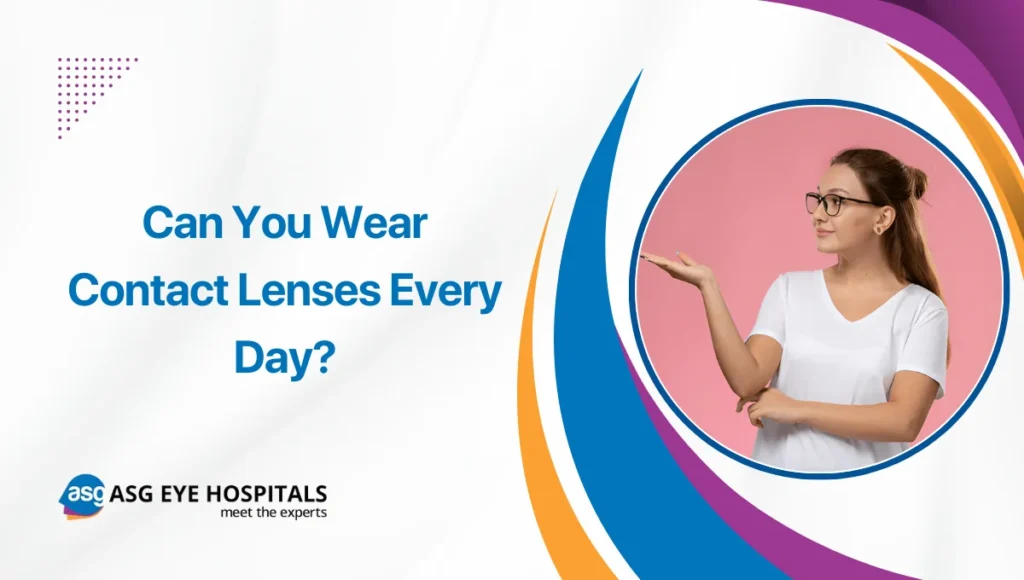Wearing contact lenses brings convenience and aesthetic advantages over regular glasses, but it’s important to consider the safety of wearing them daily. This comprehensive guide will explore the factors that influence the safety of daily contact lens wear and give practical tips on maintaining good eye health.
Contact Lenses
Contact lenses are small, curved discs designed on the same principle to fit directly on the eye’s cornea. They correct vision distortion by reshaping the light rays that enter the eye. They are made in many different forms, such as:
- Daily Disposable Lenses: Single-use and discarded after the single-day use.
- Extended Wear Lenses: Worn overnight for up to a week or continuously for as long as a month in some cases.
- Monthly and Biweekly Lenses: Designed to be replaced on a regular schedule, typically every two weeks or monthly.
- Hard Gas Permeable (RGP) Lenses: Made of rigid materials that allow oxygen flow to the cornea.
Safety Concerns of Daily Wear
- Oxygen Supply to the Cornea: One of the primary concerns with wearing contact lenses daily is ensuring that your cornea receives adequate oxygen. The cornea needs constant oxygen to maintain good health and function properly. Traditionally, contact lenses, especially older versions, hinder oxygen flow. This can lead to complications such as corneal hypoxia due to oxygen deprivation in the cornea. Most modern lenses, particularly those made of silicone hydrogel, are designed to improve oxygen permeability to the eye, thus reducing this risk.
- Risk of Infection: Wear contact lenses daily, comes along with an added risk to your eyes through infection, mainly if their users do not exercise good hygiene. Bacteria and fungi, among other microorganisms, may collect on the contact lenses or in the lens case and then infect conjunctivitis and keratitis, among others. This risk is reduced with daily disposables since cleaning and storage are eliminated; each pair is only used once.
- Dry Eyes and Discomfort: Protracted daily wearing of contact lenses may inflict dryness or discomfort. The lens may suck out your tear film lubrication and irritate your eyes. Those who already underlying dry eye conditions or spend long hours in air-conditioned or heated environments may be at a higher risk. Regular eye breaks with the application of artificial tears may help in the fight against such problems.
Daily Wear Contact Lens Hygiene and Safety Tips
- Follow Your Eye Care Professional’s Advice: Always follow the wearing schedule and replacement recommendations given by your eye care specialist; they will prescribe lenses that best fit your needs and way of life.
- Practice Good Hygiene: Always wash your hands before touching your lenses. Do not use tap water or saliva on your lenses, as they can transmit harmful microorganisms.
- Proper Lens Care: Clean and disinfect your lenses appropriately, if you have non-disposable lenses. Even daily disposables should be touched only with clean, dry hands.
- Replace Your Lenses on Time: Always replace your contact lenses on time by following the replacement schedule for your particular type of lenses. For example, do not wear monthlies for more weeks than recommended.
- Avoid Over-Wearing: Your eyes can get rest from the lenses by removing them at frequent intervals. This becomes more necessary if you feel irritation or dryness in your eyes. You may use glasses, if possible, to give your eyes some time to rest.
- Watch for Symptoms: Look out for the signs of infection or any other problem with your eyes. The major symptoms include redness, itching, or unusual discharge. Contact your eye care provider immediately in case any such symptom is found.
- Lubricating Drops: Overheating or irritation can be treated with lubricating eye drops specially designed for contact lenses. Do not take non-prescribed drops that are not designed to mix with your contact lenses.
- Keep Yourself Hydrated: Keeping yourself well-hydrated can stimulate your general health in the eyes and prevent dryness.
- Be Careful in Extremes of Environments: If you are exposed to dust, smoke, or chlorinated water, for example, while swimming, it is beneficial to wear protective eyewear or glasses for that purpose, this prevents eye irritation and infection.
The Advantages of Daily Wear Lenses
Daily disposables have some advantages to their use that can benefit safety and convenience:
- Low Risk of Infection: Since a new pair is used every day, the risk of infection because of bacterial collection on the lens or in the lens case is minimal.
- No Need for Cleaning Solutions: You do not need any solutions for cleaning purposes or disinfection, thereby making the entire process easy regarding maintenance.
- Fresh and Comfortable Lenses: Lenses changed daily mean that the vision will be clear and with comfort, minus deposits or accumulation of proteins.
- Convenience: Ideal for those with busy lifestyles or who travel frequently, as there is no need to carry lens cleaning supplies or a case.
Conclusion
While daily contact lens wear can be safe and convenient, it requires proper guidance and practice. Advances in contact lens technology, particularly in oxygen permeability and the availability of daily disposables, have greatly enhanced the safety and comfort of daily wear. However, it’s crucial to maintain good hygiene, follow replacement schedules, and regularly monitor your eye health. It’s important to consult the top eye specialist doctor to determine the most suitable contact lenses for your needs and to receive guidance on safe use. By following eye health tips and taking proactive steps to protect your eye health, you can minimize the daily contact lens wear risks and enjoy the benefits of daily contact lens use.




